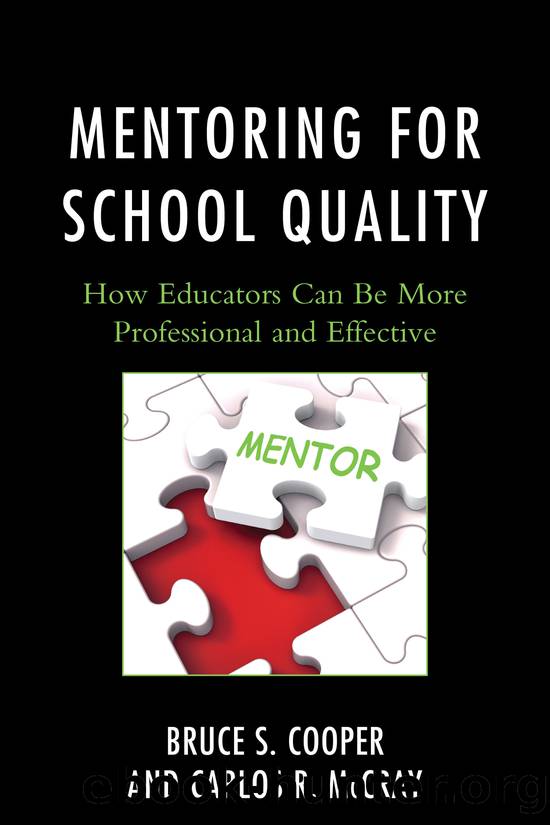Mentoring for School Quality by Cooper Bruce S. ;McCray Carlos R.;

Author:Cooper, Bruce S.,;McCray, Carlos R.;
Language: eng
Format: epub
Publisher: Rowman & Littlefield Publishers
Chapter 6
Teacher Mentoring Practices and Models
What Can We Learn from Research and Effective Practices?
Chun Zhang
Introduction
Having highly qualified teachers is one of the most important variables in contributing to positive student outcomes, to closing achievement gaps, and to preventing school failure (Phillips, 2010). However, new teachers need support and mentoring in the beginning years of their teaching careers for them to become highly qualified educators (Barrera, Braley, & Slate, 2010). Beginning teachers who were provided with well-structured mentoring had higher levels of student engagement than those who were not (Stanulis & Floden, 2009). Studies also indicate that rigorous, well-planned, and well-structured mentoring programs hold great potential for improving beginning teachersâ practices and for affecting studentsâ academic outcomes positively (Hobson et al., 2009; Mathur, Gehrke, & Kim, 2012; Smith & Ingersoll, 2004).
As schools and teacher education programs face the challenges of preparing and keeping highly qualified teachersâespecially for low-performing urban schoolsâgood or effective mentor characteristics and mentoring practices and models that have promise and evidence of success need to be examined and disseminated. This chapter will examine the literature and research in the areas of effective teaching, mentor characteristics, and teacher mentoring practices and models. Important indicators and characteristics of mentors and mentoring programs will be highlighted. Practical applications of how schools can conceptualize, plan, and implement successful mentoring programs will be discussed.
Characteristics of Effective Teaching
Effective teachers of high-achieving students tend to have the following five characteristics: (1) high expectations, (2) a focus on academic instruction that engages, motivates, and challenges students, (3) have smooth transitions during activities, (4) address the needs of students, and (5) connect curriculum with studentsâ interests and experiences. These teachers are clear and enthusiastic in the delivery of instruction, and they use time effectively (Brophy & Good, 1986).
In addition, they also manage their classrooms effectively through developing routines and procedures and helping students learn self-regulation and independent thinking and problem-solving skills. They create a comfortable, intellectually stimulating, and collaborative learning environment where authentic, interesting, and challenging activities are provided. They also monitor studentsâ learning and progress, and scaffold student learning to a deep understanding of curriculum across domains and content areas (Bogner, Raphael, & Pressley, 2002; Dolezal, Welsh, Pressley, & Vincent, 2003; Roehrig, Bohn, Turner, & Pressley, 2008).
These teaching behaviors and skills are found to be conducive to studentsâ learning and to promoting positive student outcomes. In general, teachersâ attitudes, beliefs, and knowledge affect teachersâ behaviors and skills to work with their students, having an impact on studentsâ engagement and learning. Specifically, teachersâ instructional skills and practices are found to have direct effects on studentsâ achievement, whereas other teacher characteristics such as teacher beliefs and knowledge may have an indirect impact on student learning and achievement (Roehrig et al., 2008; Muijs & Reynolds, 2002).
Todayâs new teachers face many challenges and need to become effective in the first few years of their teaching careers in learning the skills of planning and implementing curriculum and instruction, conducting different types of assessments, engaging and motivating students, guiding studentsâ behaviors, and
Download
This site does not store any files on its server. We only index and link to content provided by other sites. Please contact the content providers to delete copyright contents if any and email us, we'll remove relevant links or contents immediately.
The Art of Coaching Workbook by Elena Aguilar(51199)
Trainspotting by Irvine Welsh(21666)
The Secret History by Donna Tartt(19088)
Twilight of the Idols With the Antichrist and Ecce Homo by Friedrich Nietzsche(18633)
All the Missing Girls by Megan Miranda(16028)
Cat's cradle by Kurt Vonnegut(15355)
Ready Player One by Cline Ernest(14675)
Talking to Strangers by Malcolm Gladwell(13370)
Fangirl by Rainbow Rowell(9251)
The remains of the day by Kazuo Ishiguro(8999)
The Compound Effect by Darren Hardy(8967)
Thirteen Reasons Why by Jay Asher(8910)
Tools of Titans by Timothy Ferriss(8396)
Periodization Training for Sports by Tudor Bompa(8273)
Wonder by R. J. Palacio(8110)
The Lover by Duras Marguerite(7902)
A Court of Wings and Ruin by Sarah J. Maas(7847)
Change Your Questions, Change Your Life by Marilee Adams(7783)
The Complete Stick Figure Physics Tutorials by Allen Sarah(7373)
